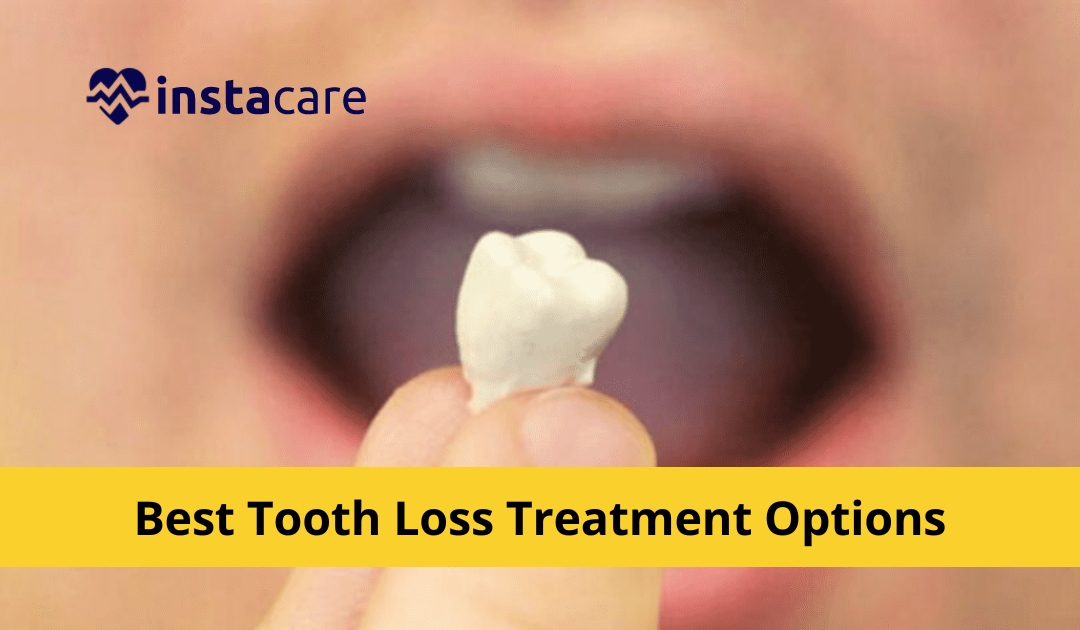Are you suffering from tooth loss? Whether it's due to poor oral health, an accident, or advanced age, you don't have to live in fear of a lifelong dental problem. Modern medicine has opened the door to a variety of groundbreaking treatments for tooth loss that promise long-term solutions and improved quality of life. Today we'll be discussing five of the best available treatment options so you can make an informed decision on what works best for your lifestyle needs. Keep reading on to discover how science is making teeth replacement simpler than ever!
1- Dental implants
Dental implants are becoming an increasingly popular best tooth loss treatment option for individuals of all ages. They are the best choice for replacing a single tooth, as well as multiple teeth in succession for those looking for a permanent solution. Dental implants involve placing one or more titanium posts into jawbone and securing a dental crown or bridge on top of them.
The best part about this procedure is that it can help restore both the form and function of the missing teeth, making it look and feel just like natural teeth. Implants don't require reducing healthy parts of other teeth either, and they can last a lifetime with proper care.
Advantages of dental implants
Dental implants are a tooth loss treatment option that offer advantages to traditional tooth replacement methods. They are permanent fixtures, permanently anchored into the jawbone like natural teeth and have no long-term effects on adjacent teeth. In addition, they provide a higher levels of comfort than other tooth replacement options and offer an aesthetically pleasing artificial tooth, which improves chewing and speaking ability.
Implants prevent bone loss due to their direct integration with the bone, providing optimal facial structure support and stability. With proper care, they can last for many years; in some cases even a lifetime! Not only do dental implants dramatically improve oral health and hygiene, but also boost confidence by improving appearance on top of that!
Disadvantages of dental implants
Dental implants are emerging as a tooth loss treatment option, but potential patients should also be aware of the primary disadvantages associated with this prominent procedure. The upfront cost is often relatively high compared to other tooth replacement procedures such as dentures or bridges, but even so, dental implants are not a permanent tooth loss solution – they only last up to 10 years and require closely monitored maintenance throughout their lifetime.
Additionally, many dental implant treatments necessitate multiple additional surgeries and heal slowly over two to six months. So although dental implants can bring confidence and restoring normal functions from tooth loss, it may take some evaluative thought before deciding on this tooth loss treatment option.
2- Tooth-supported bridge
A tooth-supported bridge is a tooth loss treatment option that involves placing crowns and pontics on teeth on either side of the space to fill it in. This tooth replacement solution relies on strong support from the existing surrounding teeth for its structure. In order for the bridge to be held in place, tooth abutment preparation must occur prior to placement.
During this process, enamel will be trimmed away from each tooth so as to make room for a custom crown, which will then securely hold the artificial teeth together. A tooth-supported bridge is a great restoration option in cases where one or two teeth are missing, providing reliable, natural-looking results.
Advantages of tooth-supported bridge
A tooth-supported bridge is an excellent tooth loss treatment option for those who wish to replace a lost tooth or multiple teeth. This type of bridge uses existing teeth on either side as anchors and attaches artificial teeth in between them. This can be advantageous because it restores healthy form and function, while still being able to remove food particles that may collect under the bridge.
Additionally, tooth-supported bridges restore strength and stability of the bite when chewing, which can be beneficial if the missing tooth is near the back molars of the mouth. Moreover, this tooth loss treatment option usually takes two to three dental appointments before finally being placed and is typically less expensive than other treatments, providing an economic benefit along with aesthetics.
Disadvantages of tooth-supported bridge
Tooth-supported bridge is a tooth loss treatment option that uses metal frames secured to opposing teeth that support the bridge's false tooth in the space left by missing tooth. While this may be one of the more affordable tooth-loss remedies and may seem like a good option, it actually has its downsides. The metal frames used to secure the bridge can weaken supporting teeth, as they are essentially drilling two perfectly fine teeth to hold up an artificial tooth.
View More: Best Teeth Pain Tablet In Pakistan
Additionally, tooth decay or tooth trauma could render this particular tooth-loss remedy useless if any of the other surrounding teeth are significantly compromised. For those looking for a longterm treatment, tooth-supported bridges probably won't cut it; indeed, dentists suggest replacing them every 10 years or so.
3- Implant-supported bridge
For those dealing with tooth loss, there is an option that you may wish to explore: an implant-supported bridge. An implant-supported bridge is a tooth replacement option that consists of artificial teeth supported by implants situated within the jawbone. Its advantage compared to traditional bridges is that the adjacent teeth are left untouched and the bridge itself is held firmly in place, reducing the risk of slippage or gagging.
Furthermore, because implants fuse directly with the jawbone, this tooth loss treatment can help maintain facial structure and prevent bone deterioration. To learn more about how an implant-supported bridge can benefit you, speak with your dentist today.
Advantages of implant-supported bridge
Implant-supported bridges are an tooth loss treatment option often sought out by those who want a more stable solution to tooth replacement than traditional bridges. This tooth rebuilding technique has many advantages, including being custom-created for each patient's mouth and jaw structure.
Furthermore, compared to traditional bridges, implant-supported bridges are less likely to damage surrounding teeth or gum tissue because the specialized posts used in the procedure act as tooth roots, providing additional stability and added security.
As a result, patients can enjoy the same chewing power of their original teeth with significantly fewer maintenance issues. All in all, if you are looking for a tooth replacement option that provides long-term functionality and is built to last, an implant-supported bridge may be your best treatment solution.
Disadvantages of implant-supported bridge
Implant-supported bridges are a tooth loss treatment option that can help bridge significant tooth gaps. However, this form of dental restoration comes with several challenges and drawbacks. Firstly, the placement of implants requires a complicated oral surgery procedure; this has risks associated with it and some patients may experience post-surgery complications such as nerve damage.
Additionally, the total cost for an implant supported bridge may be expensive, especially if multiple teeth need to be replaced. Finally, the healing time can take several months after surgery to correctly position the implants and secure the bridge into place; thus it is not a short-term tooth loss solution. For those considering implant-supported bridges as a tooth restoration option should consult their dentist for more information about its advantages and disadvantages.
4- Removable partial dentures
Removable partial dentures are a tooth loss treatment option which provides the patient with the most natural tooth replacement look. They provide a secure fit and can greatly improve chewing and speech abilities compared to other tooth replacement options. Partial dentures are typically made from acrylics, metal or combinations of both materials and are supported by a person's gums and surrounding teeth.
The overall design is tailored to the patient's situation, tooth missing and mouth anatomy for an exact fit and feel. Removable partial dentures are a great solution for those that have experienced tooth loss but desire a natural appearance, comfort and convenience with their tooth replacement option.
Advantages of removable partial dentures
Removable partial dentures offer tooth loss treatment that is often less costly and time- efficient than many other tooth replacement options. They are capable of restoring large areas of tooth loss without the need for major dental surgery, thereby greatly reducing recovery time. Removable partial dentures also provide stability to surrounding teeth, as well as protection to the gums and remaining tooth structure by helping minimize further tooth loss.
Furthermore, they are highly customizable, so you can choose an option that naturally blends into your existing smile. With proper care and maintenance, removable partial dentures can last for many years and provide an ideal solution for those seeking a tooth loss treatment option with all the advantages of cost efficiency, convenience and high attractiveness.
Disadvantages of removable partial dentures
Removable partial dentures can be a tooth loss treatment option, however, they can come with some disadvantages. These include the possibility of creating a gag reflex in those who are uncomfortable with the sensation of having something inside their mouth, as well as increased plaque buildup and tooth decay due to the materials used in a removable partial denture being porous and difficult to keep clean.
They can also cause some discomfort for people who are very active or struggle with chronic tooth pain as the presence of the partial denture may exacerbate these issues. Ultimately, it is important to weigh both the advantages and disadvantages when considering any tooth loss treatment option.
5- Flipper
Flipper tooth replacement is an effective and low-cost tooth loss treatment option. It works by hiding the gaps between adjacent teeth, also known as a prosthetic tooth. Flippers are made of plastic and acrylic resin to provide an aesthetic solution to tooth loss.
The process for getting flipper teeth generally takes about three weeks, which includes impressions, models and adjustments. They are intended for short-term use and can easily be removed or cleaned when eating or brushing teeth. If you are concerned about tooth loss, you may want to consider a flipper tooth as an excellent tooth replacement option!
Advantages
Flipper is a tooth loss treatment option which many people are opting for these days. It is an acrylic replacement tooth that clips onto the remaining teeth with the help of a metal frame to fill the gap left by tooth loss. This tooth replacement has many advantages over other tooth replacement options.
View More: What Are the Home Remedies for Teeth Whitening
Firstly, it can be customized to match the shape, color and size of your natural teeth such that it blends in perfectly with your smile. Secondly, it is easy to insert and remove so there's no need for surgery. Finally, it also helps restore biting power and speech patterns so you won't have any trouble while eating or speaking even when you have this tooth replacement installed. All in all, flipper provides users with a safe and effective tooth replacement option.
Disadvantages of flipper
Flipper dentures are a tooth loss treatment option that consists of an acrylic tooth on a plastic retaining plate. While this is often seen as an affordable and practical solution to tooth loss, there can also be drawbacks in using them too. Flippers will generally move around while speaking and eating, cause gum irritation and tenderness, and may not have the same aesthetic value as more permanent tooth replacement treatments such as dental implants or bridges.
They also require frequent maintenance due to the width of the material which can affect the fit over time. Furthermore, due to the amount of bulk needed for retention, some patients find flippers uncomfortable or difficult to insert or adjust in their mouth. All these aspects should be considered when evaluating flipper dentures as a tooth loss treatment option.
Conclusion
Losing teeth is not the end of the world and there are plenty of treatment options available to help you regain your smile. Talk to your dentist about which option is best for you and don’t be afraid to ask questions. With a little bit of research, you can find the perfect solution for your tooth loss needs.
Please book an appointment with the Best Dentist in Lahore, Karachi, Islamabad, and all major cities of Pakistan through InstaCare, or call our helpline at 03100002273 to find the verified doctor for your disease.












